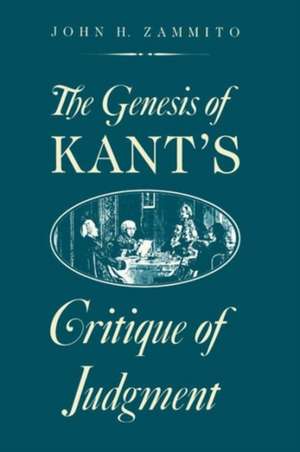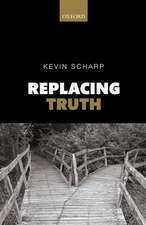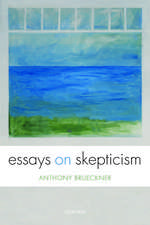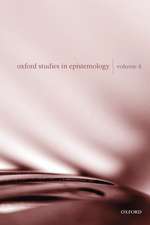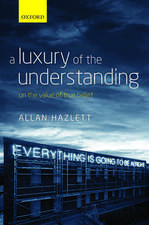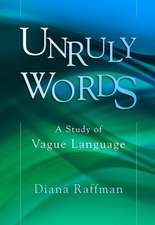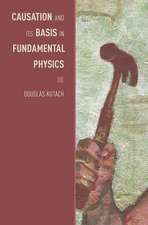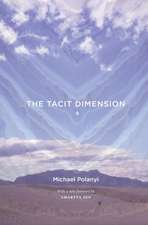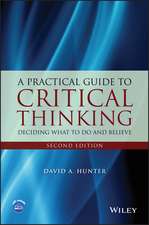The Genesis of Kant's Critique of Judgment
Autor John H. Zammitoen Limba Engleză Paperback – aug 1992
In this philosophically sophisticated and historically significant work, John H. Zammito reconstructs Kant's composition of The Critique of Judgment and reveals that it underwent three major transformations before publication. He shows that Kant not only made his "cognitive" turn, expanding the project from a "Critique of Taste" to a Critique of Judgment but he also made an "ethical" turn. This "ethical" turn was provoked by controversies in German philosophical and religious culture, in particular the writings of Johann Herder and the Sturm und Drang movement in art and science, as well as the related pantheism controversy. Such topicality made the Third Critique pivotal in creating a "Kantian" movement in the 1790s, leading directly to German Idealism and Romanticism.
The austerity and grandeur of Kant's philosophical writings sometimes make it hard to recognize them as the products of a historical individual situated in the particular constellation of his time and society. Here Kant emerges as a concrete historical figure struggling to preserve the achievements of cosmopolitan Aufkl-rung against challenges in natural science, religion, and politics in the late 1780s. More specifically Zammito suggests that Kant's Third Critique was animated throughout by a fierce personal rivalry with Herder and by a strong commitment to traditional Christian ideas of God and human moral freedom.
"A work of extraordinary erudition. Zammito's study is both comprehensive and novel, connecting Kant's work with the aesthetic and religious controversies of the late eighteenth century. He seems to have read everything. I know of no comparable historical study of Kant's Third Critique."-Arnulf Zweig, translator and editor of Kant's ;IPhilosophical Correspondence, 1759-1799;X
"An intricate, subtle, and exciting explanation of how Kant's thinking developed and adjusted to new challenges over the decade from the first edition of the Critique of Pure Reason to the appearance of the Critique of Judgment."—John W. Burbidge, Review of Metaphysics
"There has been for a long time a serious gap in English commentary on Kant's Critique of Judgment; Zammito's book finally fills it. All students and scholars of Kant will want to consult it."—Frederick Beiser, Times Literary Supplement
The austerity and grandeur of Kant's philosophical writings sometimes make it hard to recognize them as the products of a historical individual situated in the particular constellation of his time and society. Here Kant emerges as a concrete historical figure struggling to preserve the achievements of cosmopolitan Aufkl-rung against challenges in natural science, religion, and politics in the late 1780s. More specifically Zammito suggests that Kant's Third Critique was animated throughout by a fierce personal rivalry with Herder and by a strong commitment to traditional Christian ideas of God and human moral freedom.
"A work of extraordinary erudition. Zammito's study is both comprehensive and novel, connecting Kant's work with the aesthetic and religious controversies of the late eighteenth century. He seems to have read everything. I know of no comparable historical study of Kant's Third Critique."-Arnulf Zweig, translator and editor of Kant's ;IPhilosophical Correspondence, 1759-1799;X
"An intricate, subtle, and exciting explanation of how Kant's thinking developed and adjusted to new challenges over the decade from the first edition of the Critique of Pure Reason to the appearance of the Critique of Judgment."—John W. Burbidge, Review of Metaphysics
"There has been for a long time a serious gap in English commentary on Kant's Critique of Judgment; Zammito's book finally fills it. All students and scholars of Kant will want to consult it."—Frederick Beiser, Times Literary Supplement
Preț: 372.00 lei
Nou
Puncte Express: 558
Preț estimativ în valută:
71.20€ • 77.37$ • 59.85£
71.20€ • 77.37$ • 59.85£
Carte tipărită la comandă
Livrare economică 21 aprilie-05 mai
Preluare comenzi: 021 569.72.76
Specificații
ISBN-13: 9780226978550
ISBN-10: 0226978559
Pagini: 490
Dimensiuni: 152 x 229 x 36 mm
Greutate: 0.64 kg
Ediția:1
Editura: University of Chicago Press
Colecția University of Chicago Press
ISBN-10: 0226978559
Pagini: 490
Dimensiuni: 152 x 229 x 36 mm
Greutate: 0.64 kg
Ediția:1
Editura: University of Chicago Press
Colecția University of Chicago Press
Cuprins
Acknowledgments
Introduction
Part One - The Genesis of the "Critique of Aesthetic Judgment"
1. Kant and the Pursuit of Aufklärung
2. Kant's Return to Aesthetics: Transcendental Arguments and the "Critique of Taste"
3. Validity and Actuality: Toward Kant's Phenomenology of Subjective Consciousness
4. The Transcendental Grounding of Taste: Purpose and Pleasure
5. The Beautiful and the Pleasant: Kant's Transcendental Deduction of Taste
6. Kant's Philosophy of Art in the Year 1788
Part Two: The Genesis of the "Critique of Teleological Judgment"
7. The Cognitive Turn: The Discovery of Reflective Judgment
8. The Contextual Origins of Kant's Critique of Contemporary Science
9. Kant against Eighteenth-Century Hylozoism
10. The Problem of Organic Form in the "Critique of Teleological Judgment"
11. The Pantheism Controversy and the Third Critique
12. Kant's Attack on Spinoza in the "Dialectic of Teleological Judgment"
Part Three - The Final Form of the Critique of Judgment
13. The Ethical Turn in Kant's Critique of Judgment
14. The Sublime, the Symbolic, and Man's "Supersensible Destination"
15. Aesthetics As the Key to Anthropology: Lebensgefühl and Geistegefühl
16. The Unity of Man: Man As an "End-in-Himself"
17. The Unity of Mankind: The Highest Good, History, and Religion
Conclusion: The Ultimate Meaning of the Third Critique
Notes
Bibliography
Index
Introduction
Part One - The Genesis of the "Critique of Aesthetic Judgment"
1. Kant and the Pursuit of Aufklärung
2. Kant's Return to Aesthetics: Transcendental Arguments and the "Critique of Taste"
3. Validity and Actuality: Toward Kant's Phenomenology of Subjective Consciousness
4. The Transcendental Grounding of Taste: Purpose and Pleasure
5. The Beautiful and the Pleasant: Kant's Transcendental Deduction of Taste
6. Kant's Philosophy of Art in the Year 1788
Part Two: The Genesis of the "Critique of Teleological Judgment"
7. The Cognitive Turn: The Discovery of Reflective Judgment
8. The Contextual Origins of Kant's Critique of Contemporary Science
9. Kant against Eighteenth-Century Hylozoism
10. The Problem of Organic Form in the "Critique of Teleological Judgment"
11. The Pantheism Controversy and the Third Critique
12. Kant's Attack on Spinoza in the "Dialectic of Teleological Judgment"
Part Three - The Final Form of the Critique of Judgment
13. The Ethical Turn in Kant's Critique of Judgment
14. The Sublime, the Symbolic, and Man's "Supersensible Destination"
15. Aesthetics As the Key to Anthropology: Lebensgefühl and Geistegefühl
16. The Unity of Man: Man As an "End-in-Himself"
17. The Unity of Mankind: The Highest Good, History, and Religion
Conclusion: The Ultimate Meaning of the Third Critique
Notes
Bibliography
Index
